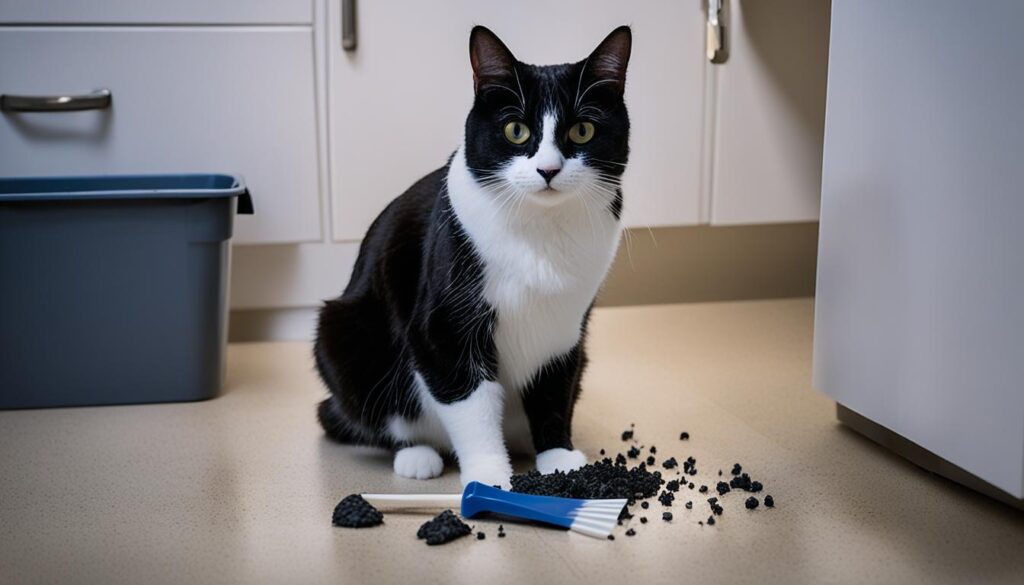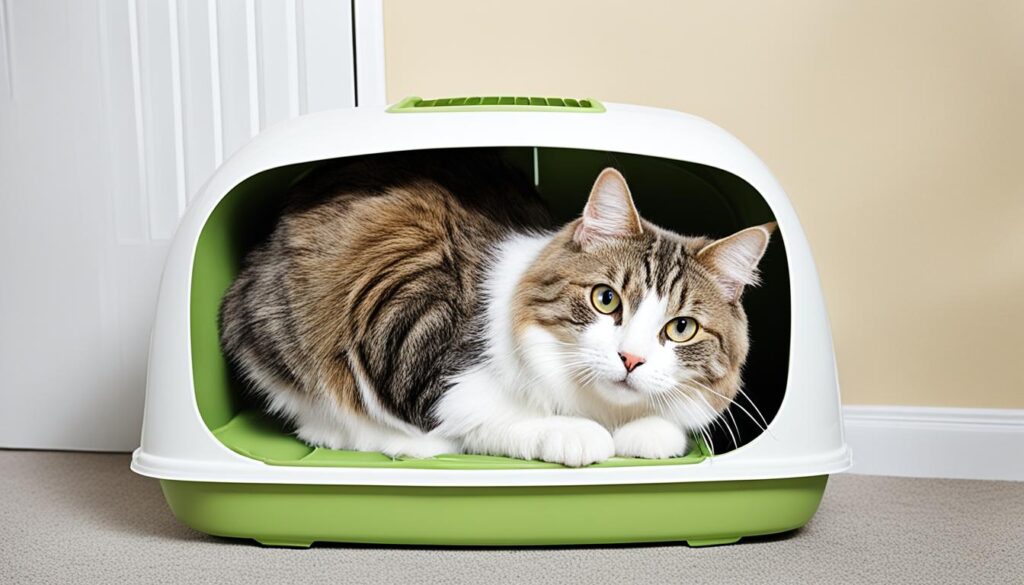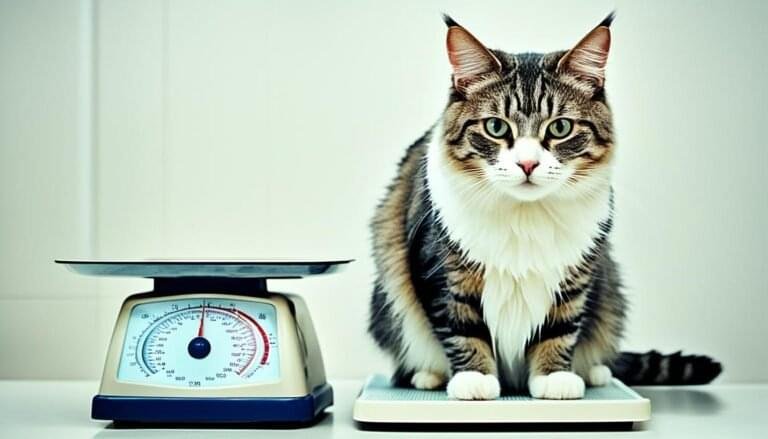Solving Cat Pooping Outside Litter Box: Did you know that nearly 10% of indoor cats develop litter box problems at some point in their lives? If you’re dealing with the frustrating issue of your cat pooping outside the litter box, you’re not alone. This common behavior problem can have various underlying causes, from health issues to environmental stressors. However, with the right approach, it can be resolved. In this article, I will explore the reasons behind this behavior and provide effective strategies to stop your cat from pooping outside the litter box.
Cat Pooping Outside Litter Box Key Takeaways:
- Nearly 10% of indoor cats experience litter box problems.
- Multiple factors can contribute to cats pooping outside the litter box, including health issues and stress.
- Consulting a veterinarian is crucial to rule out any underlying medical conditions.
- Proper litter box maintenance and environmental adjustments can help prevent this behavior.
- Consistency and patience are key when training your cat to use the litter box consistently.
Common Reasons for Cats Pooping Outside the Litter Box
Cats may poop outside the litter box due to various reasons, including health conditions, behavioral issues, and environmental factors. Understanding these common reasons can help address the problem and prevent it from recurring.
Health Conditions
Some health conditions, such as constipation or diarrhea, can cause cats to poop outside the litter box. When cats experience urgency or discomfort due to these conditions, accidents may happen. Additionally, older cats with arthritis may find it challenging to access the litter box, leading to accidents.
Behavioral Issues
Stress caused by changes in the home environment or an unsuitable litter box setup can contribute to cats pooping outside the litter box. Cats are sensitive to their surroundings, and any disruptions or discomfort can result in litter box issues. It is important to address any underlying stress or behavioral issues to mitigate this behavior.
Environmental Factors
The environment around the litter box can also influence a cat’s behavior. Factors such as the cleanliness of the litter box, the type of litter used, and the location of the litter box can affect a cat’s willingness to use it. Cats are clean animals and prefer a well-maintained and accessible litter box.
| Reason | Explanation |
|---|---|
| Health Conditions | Constipation, diarrhea, or arthritis can contribute to cats pooping outside the litter box. |
| Behavioral Issues | Stress or discomfort caused by changes in the home environment or an unsuitable litter box setup. |
| Environmental Factors | Cleanliness, litter type, and litter box location can influence a cat’s behavior. |
Medical Conditions That Can Cause Cats to Poop Outside the Litter Box
Cats may poop outside the litter box due to various medical conditions that can affect their bowel movements and mobility. Understanding these conditions can help you identify the underlying causes and take appropriate action. The most common medical issues that can cause cats to poop outside the litter box include:
1. Constipation in Cats
Constipation occurs when a cat has difficulty passing stool, resulting in infrequent or hard bowel movements. This can make it challenging for cats to reach the litter box in time, leading them to poop outside of it. Factors that contribute to constipation in cats include dehydration, lack of dietary fiber, and certain medical conditions.
2. Diarrhea in Cats
On the other end of the spectrum, diarrhea can also cause cats to poop outside the litter box. Diarrhea is characterized by loose, watery stools and can be caused by various factors such as dietary changes, food allergies, infections, or underlying health conditions. The urgency and increased frequency of bowel movements can result in accidents outside of the litter box.
3. Arthritis in Cats
Arthritis is a degenerative joint disease commonly seen in older cats. It can cause pain, stiffness, and reduced mobility, making it challenging for cats to climb into the litter box. As a result, they may seek alternative places to relieve themselves, leading to accidents outside the litter box.
If your cat is consistently pooping outside the litter box, it is crucial to consult a veterinarian. They can perform a thorough examination, diagnose any underlying medical conditions, and recommend appropriate treatment. Addressing these medical issues will significantly improve your cat’s litter box habits and overall well-being.
| Medical Condition | Symptoms | Treatment |
|---|---|---|
| Constipation | Infrequent bowel movements, dry and hard stools, straining during defecation | Increased hydration, dietary fiber, laxatives, medication |
| Diarrhea | Watery stools, increased frequency of bowel movements, urgency | Dietary changes, medication, addressing underlying causes |
| Arthritis | Pain, stiffness, reduced mobility | Pain management, joint supplements, environmental modifications |
Behavioral Issues and Stress as Factors for Cats Pooping Outside the Litter Box
Cats may poop outside the litter box due to various behavioral issues and stressors. Environmental changes can greatly impact a cat’s litter box habits. Moving to a new home, introducing a new pet, loud noises, or any major changes in routine or environment can cause stress and anxiety in cats, leading to litter box problems.
Cats are creatures of habit, and any disruption to their established routine can unsettle them. This can result in them avoiding the litter box and choosing alternative locations to relieve themselves. It’s important to identify and address these stressors to help your cat feel more comfortable and reduce the chances of them pooping outside the litter box.
Creating a calm and secure environment for your cat is key. Minimizing loud noises, maintaining a consistent routine, and providing a designated space for your cat to feel safe and secure can help alleviate stress. Additionally, spending quality time with your cat, providing enrichment activities, and offering plenty of hiding spots can also contribute to their overall well-being.
When a cat feels stressed, they may exhibit changes in behavior, including avoiding the litter box. By addressing the root cause of their stress and environmental changes, you can help your cat return to using the litter box consistently.
Common Stressors for Cats:
- Moving to a new home
- Introducing a new pet
- Loud noises
- Changes in routine or environment
This image illustrates the emotions and stress that cats may experience due to environmental changes or behavioral issues.
Addressing Litter Box Issues to Prevent Cats from Pooping Outside the Litter Box
Proper maintenance of the litter box is crucial to prevent cats from pooping outside the litter box. Follow these tips to ensure your cat’s litter box is clean, comfortable, and enticing:
- Litter box cleanliness: Scoop clumps from the litter box daily to maintain cleanliness and remove any odors. Cats prefer a clean litter box and may avoid using it if it’s dirty.
- Litter box location: Choose a quiet, easily accessible area for the litter box. Keep it away from their food and water bowls, as cats prefer separate spaces for each activity.
- Litter box size: Ensure the litter box is large enough for your cat to comfortably move and turn around in. Cats prefer a spacious litter box that allows them to dig and cover their waste.
- Litter type: Use unscented litter as cats have a sensitive sense of smell and may be deterred by strong fragrances. Experiment with different litter types to find the one your cat prefers.
For multi-cat households, consider providing multiple litter boxes to avoid territorial issues and ensure each cat has its own space. Additionally, deep clean the litter box regularly to maintain hygiene and prevent any buildup of bacteria or odors.
| Litter Box Tips | Benefits |
|---|---|
| Keep the litter box clean | Prevents odor and encourages cats to use it |
| Choose a quiet location | Reduces stress and provides privacy for cats |
| Ensure proper litter box size | Allows cats to move comfortably and exhibit natural behaviors |
| Use unscented litter | Prevents aversion to strong fragrances |
By addressing litter box issues and creating a favorable environment, you can encourage your cat to use the litter box consistently and minimize the chances of them pooping outside of it.
Tips to Encourage Cats to Use the Litter Box
Training your cat to use the litter box is essential for preventing them from pooping outside of it and resolving litter box issues. Here are some helpful tips to encourage your cat’s litter box training:
- Show them the location: Introduce your cat to the litter box and ensure it is easily accessible for them. Place it in a quiet and private area where they feel comfortable.
- Positive reinforcement: Reward your cat with treats, praise, or affection when they use the litter box correctly. This positive reinforcement helps them associate the litter box with a positive experience.
- Preference replication: If your cat has a preferred surface to eliminate on, such as carpet or grass, try to replicate that texture in the litter box. You can use different types of litter or even place a small patch of carpet in a corner of the litter box.
- Consistency: Establish a regular routine for your cat’s litter box training. Ensure the litter box is clean and accessible at all times. Avoid moving the litter box frequently, as this can confuse your cat and lead to litter box aversion.
- Patience: Remember that litter box training takes time and patience. Be understanding and avoid punishing or scolding your cat for accidents outside the litter box. Instead, reinforce positive behavior and continue the training process.
By following these tips and remaining consistent in the training process, you can effectively encourage your cat to use the litter box and prevent litter box issues.
Cleaning Up After Cats Pooping Outside the Litter Box

Cleaning up after cats that poop outside the litter box is essential to prevent repeat incidents. When it comes to cleaning up cat poop, it’s important to take the right approach to ensure hygiene and discourage your cat from using the same spot again. Follow these steps to effectively clean up the mess:
Step 1: Gather the Proper Cleaning Equipment
Before you begin cleaning, gather the necessary cleaning supplies. This will help you tackle the task efficiently and minimize the spread of bacteria. Here are some essential items:
- Gloves: Wear disposable gloves to protect yourself from potential pathogens present in cat feces.
- Mask: Consider wearing a mask to avoid inhaling any airborne particles during the cleaning process.
- Enzymatic Cleaner: Use an enzymatic cleaner specifically designed to eliminate the odor and stain caused by cat feces. Enzymatic cleaners break down the organic matter, preventing your cat from being attracted to the same spot again.
- Paper Towels or Disposable Cloths: Use absorbent materials to clean up the solid waste before treating the area with the cleaner.
- Trash Bags: Have a designated bag to dispose of the used paper towels, disposable cloths, and any other waste generated during the cleanup process.
Step 2: Remove Solid Waste
Start by removing the solid waste using paper towels or disposable cloths. Carefully pick up the feces, being cautious not to press it into the surface or spread it around. If the feces is firm, gently scoop it up. In the case of diarrhea, carefully scoop up as much as possible, taking care not to smudge or smear it further.
Step 3: Apply Enzymatic Cleaner
Once the solid waste is removed, apply the enzymatic cleaner to the affected area. Follow the instructions on the cleaner’s packaging for the appropriate application method. Be sure to cover the entire soiled area to ensure effective cleaning and odor elimination.
Step 4: Allow the Cleaner to Work
After applying the enzymatic cleaner, give it enough time to work. The cleaner needs time to break down the organic matter and eliminate any lingering odors. Refer to the instructions on the cleaner’s packaging for the recommended duration.
Step 5: Blot and Dispose
After the cleaner has had sufficient time to work, gently blot the area with fresh paper towels or disposable cloths to absorb any excess moisture. Dispose of the used paper towels or disposable cloths in a trash bag.
| Benefits of Using Enzymatic Cleaners | Reasons to Wear Gloves and Mask |
|---|---|
|
|
Cleaning up cat poop promptly and effectively is crucial for maintaining a clean and healthy living environment for both you and your cat. By following the proper cleaning steps and using enzymatic cleaners, you can eliminate odors, prevent repeat incidents, and ensure a hygienic space for both you and your beloved feline companion.
When to Seek Veterinary Help for Cats Pooping Outside the Litter Box
If your cat continues to poop outside the litter box for an extended period of time, it is advisable to seek veterinary help. A veterinarian can rule out any underlying medical conditions and provide guidance on addressing behavioral issues. Regular wellness checks are also recommended to prevent future incidents.
If your cat is consistently exhibiting litter box issues and not using it appropriately, it could indicate an underlying problem. Consulting a veterinarian is crucial to ensure your cat’s health and well-being. The veterinarian will conduct a thorough examination to rule out any medical conditions that may be causing your cat to poop outside the litter box.
During the veterinary visit, it is important to provide detailed information about your cat’s behavior, any recent changes in the household, and the litter box environment. This will help the veterinarian to make an accurate diagnosis and provide appropriate treatment recommendations.
By seeking veterinary help, you can address the issue effectively and prevent further litter box problems. Remember, regular veterinary check-ups are essential for maintaining your cat’s overall health and happiness.
Tips for Senior Cats Pooping Outside the Litter Box

Senior cats may face additional challenges when using the litter box, such as arthritis or mobility issues. It’s important to address these issues and provide solutions that make it easier for them to use the litter box properly. Here are some tips:
1. Lower-sided Litter Boxes
Consider using litter boxes with lower sides to make it easier for senior cats to access. High-sided litter boxes may be difficult for cats with arthritis or limited mobility to climb in and out of. Lower-sided options provide easier entry and exit points.
2. Litter Box Ramps
If your senior cat has difficulty stepping into the litter box due to mobility issues, you can introduce a litter box ramp. A ramp provides a gentle incline that helps cats with joint problems or limited mobility navigate into the litter box with greater ease.
3. Multiple Litter Boxes
Increasing the number of litter boxes in your home can be beneficial for senior cats, especially in multi-level homes or larger living spaces. Having litter boxes available on each floor or in different areas of your home can reduce the distance your senior cat needs to travel to find a suitable place to eliminate.
4. Location and Accessibility
Ensure that the litter boxes are placed in easily accessible areas of your home. Opt for quieter and calmer spots where your senior cat can have privacy and feel comfortable. Avoid placing litter boxes in high-traffic areas or near loud appliances that may startle or disturb your cat.
5. Soft and Comfortable Litter
Choosing a soft and comfortable litter can make a big difference for senior cats. Avoid using litter with large granules or rough textures that may be uncomfortable for their sensitive paws. Opt for a litter that is soft and gentle on their feet to encourage regular use.
6. Regular Health Monitoring
Regularly monitoring the health of your senior cat is essential to prevent and address any age-related issues that may contribute to litter box problems. Schedule regular check-ups with your veterinarian to ensure your cat’s overall well-being and to address any potential health issues that may affect their litter box habits.
By implementing these tips, you can help create a more comfortable, accessible, and stress-free environment for your senior cat when it comes to using the litter box.
| Tips for Senior Cats Pooping Outside the Litter Box |
|---|
| Lower-sided Litter Boxes |
| Litter Box Ramps |
| Multiple Litter Boxes |
| Location and Accessibility |
| Soft and Comfortable Litter |
| Regular Health Monitoring |
Maintaining a Stress-Free Environment for Cats Using the Litter Box
Creating a stress-free environment for your cat is crucial in ensuring they use the litter box properly. Cats are sensitive creatures and can easily be affected by changes in their surroundings. By taking a few simple steps, you can help reduce your cat’s stress levels and eliminate litter box issues.
Minimize Loud Noises
Loud noises can be extremely stressful for cats and may cause them to avoid using the litter box. Try to keep the environment as calm and quiet as possible, especially during your cat’s litter box training period. Avoid playing loud music, vacuuming near the litter box area, or any other activities that may startle or disturb your cat.
Maintain a Consistent Routine
Establishing a consistent daily routine can greatly benefit your cat’s overall well-being and help prevent litter box problems. Cats are creatures of habit and thrive in environments with predictable routines. Try to feed your cat at the same time every day, as this can regulate their bowel movements and make it easier for them to use the litter box when needed.
Provide a Calm and Comfortable Space
Creating a calm and comfortable space for your cat can go a long way in reducing their stress levels. Make sure your cat has access to cozy sleeping spots, elevated perches, and hiding places where they can retreat when they need some alone time. Providing scratching posts and interactive toys can also help alleviate boredom and redirect any anxious behavior.
Keep the Litter Box Clean
Regular maintenance of the litter box is essential to ensure your cat feels comfortable using it. Remove clumps and solid waste from the litter box daily, and replace the litter as needed. Cats are naturally clean animals, and a dirty litter box can discourage them from using it. The cleanliness and hygiene of the litter box are vital to your cat’s litter box habits.
Address Changes in the Household
Changes in the household can be unsettling for cats and may lead to litter box issues. If there have been recent changes such as moving to a new house, welcoming a new family member or pet, or rearranging furniture, try to provide your cat with a familiar and safe space during the transition. Set up a separate area with their litter box, food, and water bowls where they can retreat and feel secure until they adjust to the changes.
By implementing these strategies, you can create a stress-free environment for your cat, promoting their well-being and ensuring they consistently use the litter box.
| Benefits of a Stress-Free Environment for Cats |
|---|
| Reduces litter box problems |
| Promotes overall well-being and happiness |
| Encourages regular litter box use |
| Reduces stress-related behavioral issues |
| Strengthens the bond between owner and cat |
Conclusion
Resolving litter box problems is essential for cats who are pooping outside the litter box. It is crucial to address the underlying health conditions, create a suitable litter box environment, and manage any stress or behavioral issues. Regular veterinary check-ups and proper cleaning and maintenance of the litter box are key in preventing this problem.
By taking the time to understand your cat’s needs and providing necessary care and attention, you can encourage them to consistently use the litter box. Patience and a consistent approach are important in overcoming litter box problems. Remember, cats rely on us to provide them with a clean and comfortable environment that meets their specific needs.
With a holistic approach to solving litter box problems, you can ensure your cat’s well-being and maintain a harmonious living environment. Remember to consult a veterinarian for any persistent issues and seek their guidance in creating a stress-free and comfortable litter box routine for your feline companion. By addressing these challenges, you can successfully resolve litter box issues and enjoy a happy and healthy relationship with your cat.
FAQ
Why is my cat pooping outside the litter box?
What medical conditions can cause cats to poop outside the litter box?
What are some behavioral issues that can lead to cats pooping outside the litter box?
How can I address litter box issues to prevent my cat from pooping outside the litter box?
How can I train my cat to use the litter box?
How should I clean up after my cat poops outside the litter box?
When should I seek veterinary help for my cat pooping outside the litter box?
What are some tips for senior cats pooping outside the litter box?
How can I maintain a stress-free environment for my cat to use the litter box?
References
| International Cat Association (TICA) | https://www.tica.org/ |
| The Cat Fanciers’ Association (CFA) | https://cfa.org/ |
| World Cat Federation (WCF) | https://www.wcf-online.de/ |
| Fédération Internationale Féline (FIFe) | https://www.fifeweb.org/ |







